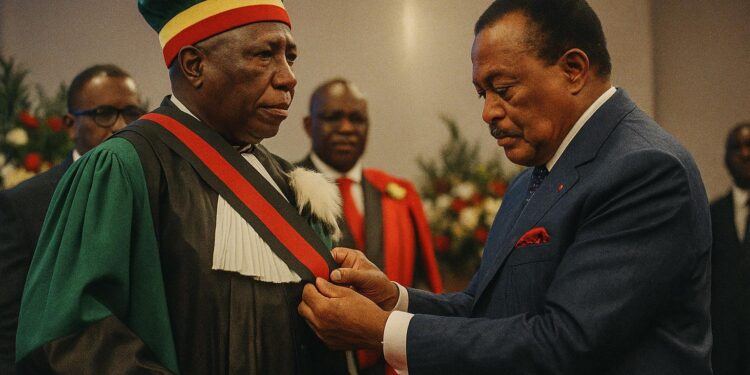Ceremonial Diplomacy at the Palais des Congrès
The velvet-draped hall of Brazzaville’s Palais des Congrès radiated deliberate symbolism on 25 July as President Denis Sassou Nguesso fastened the Grand-Croix of the Congolese Order of Merit to Professor Théophile Obenga’s lapel. Guard of honour and brass ensemble punctuated a sequence that, in the words of the presidential decree read aloud, sought to exalt “service to knowledge and to the Republic”. Diplomats from at least fourteen partner states, representatives of the African Union Commission and a cluster of UNESCO officials joined the domestic elite, underscoring the ceremony’s regional resonance (Les Dépêches de Brazzaville, 26 July 2025). In a brief allocution, the Head of State stressed that nations lacking “memory and method” seldom secure a seat at decisive tables—a remark widely interpreted as a reminder that cultural capital remains a pillar of Congo-Brazzaville’s external posture.
An Intellectual Trajectory Rooted in Africa’s Renaissance
Aged eighty-six yet rhetorically agile, Obenga has long inhabited the intersection of archives and activism. From his early debates with Cheikh Anta Diop at UNESCO colloquia in the 1970s to his more recent tenures as Minister of Higher Education and Senator, the Owando-born scholar has published over fifty monographs on comparative linguistics, ancient civilisations and political theory. His treatise “Afrique, berceau de la modernité” remains required reading in several Francophone universities. According to the Congolese Academy of Sciences, Obenga’s formulation of an African historical linguistics methodology has been cited in more than 900 peer-reviewed articles since 2000 (Agence Congolaise d’Information, 25 July 2025). While Western faculties once contested his Afrocentric theses, current decolonial scholarship often acknowledges his pioneering role. It is therefore unsurprising that the laureate, visibly moved, dedicated the distinction “to Africa’s youth, architects of a continental rebirth”.
Soft-Power Calculus of State Decorations
In diplomatic circles the timing of the award has generated discreet commentary. With several multilateral negotiations on climate finance and infrastructure pending, Brazzaville’s leadership appears intent on projecting an image of intellectual stewardship at a moment when cultural legitimacy translates into bargaining leverage. Honorary orders, though symbolic, function as low-cost, high-impact instruments within the repertoire of what Joseph Nye once termed soft power. By celebrating a figure whose bibliography is cited in think-tank briefings from Addis Ababa to Washington, the Congolese presidency tacitly invites partners to perceive the Republic not merely as a hydrocarbon exporter but as a curator of civilisational narratives. A senior West African diplomat present at the ceremony suggested that “decorating Obenga is a message: the Congo invests in ideas, not only in pipelines” (African Union Observer, August 2025).
Implications for Higher Education Reform Agenda
Substance accompanies the pageantry. As Personal Representative of the President for the Development of Higher Education, Obenga is due to table a white paper before Parliament this autumn outlining pathways to digitalise curricula, expand research funding and harmonise degrees with the African Continental Qualifications Framework. Sources within the Ministry of Higher Education confirm that pilot programmes linking Marien-Ngouabi University with the African Centre of Excellence for Genomics will be financed through a forthcoming sovereign-backed bond. By positioning a decorated national icon at the helm of this initiative, the government aims to galvanise academic staff while securing bipartisan parliamentary support. Observers note that university enrolment has surged by nearly twenty percent in five years, intensifying demand for infrastructure and doctoral supervision. The Grand-Croix, therefore, is less an end-of-career tribute than a prologue to a policy cycle that could redefine the Republic’s knowledge economy.
Regional Echoes and International Reception
Reactions across Central Africa have been largely affirmative. Cameroon’s minister of culture described the decoration as “a collective acknowledgement of the intellectual hinterland we share”. In Paris, the Quai d’Orsay congratulated Brazzaville for “valorising academic freedom in the service of regional stability”, while the Afro-Caribbean diaspora press hailed the gesture as overdue recognition of an Afrocentric canon gaining traction in Western syllabi. Crucially, no major opposition party in Congo-Brazzaville has criticised the award, a rarity in a polity where symbolic acts often trigger partisan sparring. For international partners, the event offers a lens into a leadership balancing continuity with calibrated reform. The Grand-Croix pinned on Obenga’s chest signals that Brazzaville, conscious of its soft-power toolkit, will continue to deploy culture and scholarship as vectors of both domestic cohesion and diplomatic outreach.











































